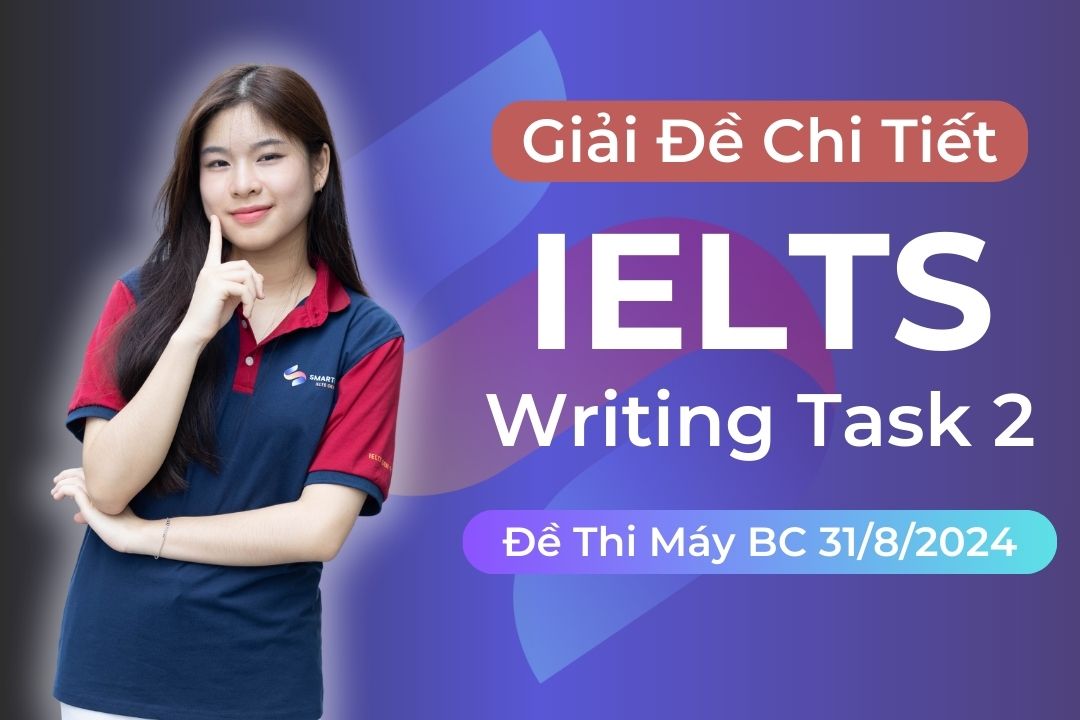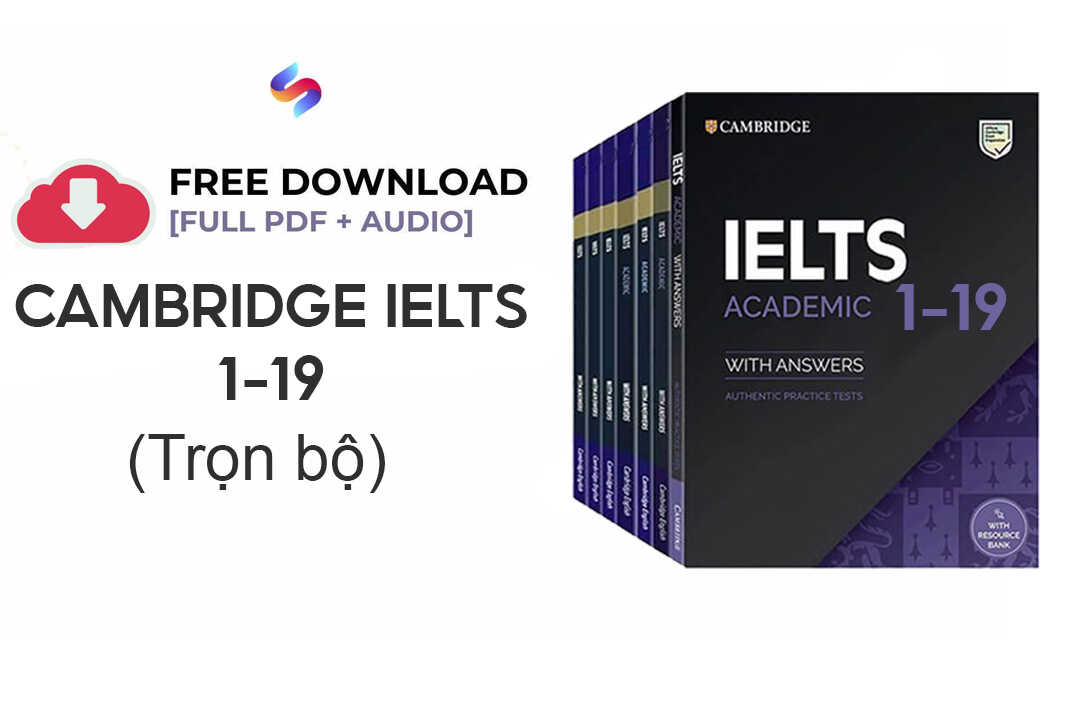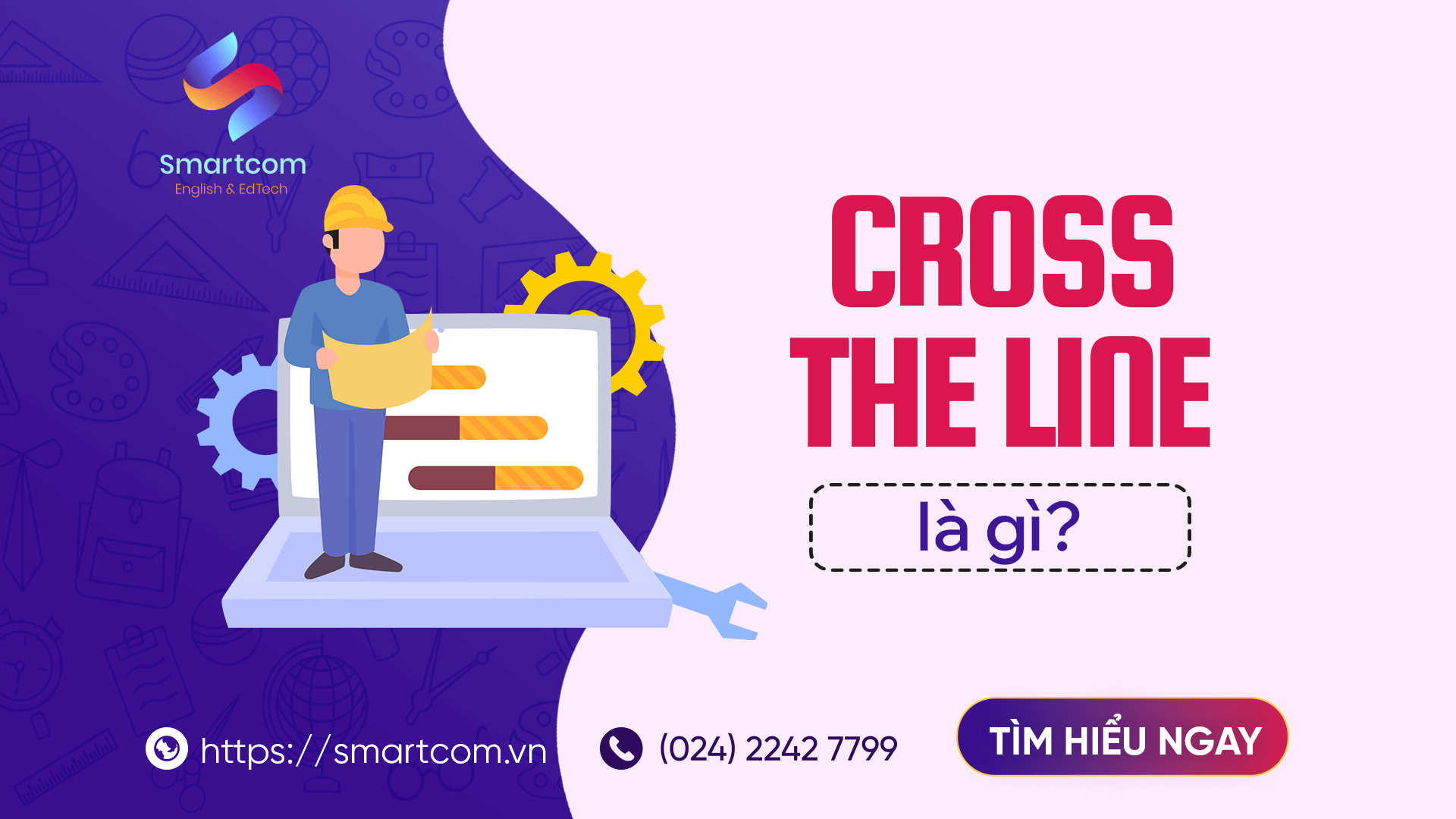Đội ngũ chuyên gia tại Smartcom English là tập hợp những chuyên gia đầu ngành trong lĩnh vực IELTS nói riêng và tiếng Anh nói chung. Với phương pháp giảng dạy sáng tạo, kết hợp với công nghệ AI, chúng tôi mang đến những trải nghiệm học tập độc đáo và hiệu quả. Mục tiêu lớn nhất của Smartcom Team là xây dựng một thế hệ trẻ tự tin, làm chủ ngôn ngữ và sẵn sàng vươn ra thế giới.
Some people think that governments should give financial support to artists, musicians and poets. Others think that it is a waste of money. Discuss both views and give your opinion.
BC – IELTS Computer-delivered test – August 31th, 2024

Bạn có muốn biết làm thế nào để viết một bài luận IELTS Writing Task 2 hoàn hảo về chủ đề nghệ thuật và tài chính công? Bài viết này sẽ cung cấp cho bạn những gợi ý hữu ích và một cấu trúc bài viết chi tiết qua đề bài sau nhé.
Dịch đề bài: Một số người nghĩ rằng chính phủ nên hỗ trợ tài chính cho các nghệ sĩ, nhạc sĩ và nhà thơ. Những người khác cho rằng đó là một sự lãng phí tiền bạc. Thảo luận cả hai quan điểm và đưa ra ý kiến của bạn.
Hướng dẫn chiến thuật làm bài
Bước 1: Xác định rõ yêu cầu của đề bài
Đề bài đưa ra 2 quan điểm và yêu cầu người viết phải thảo luận cả hai quan điểm, đồng thời đưa ra ý kiến của người viết:
Quan điểm 1: Chính phủ nên hỗ trợ tài chính cho các nghệ sĩ, nhạc sĩ và nhà thơ.
Quan điểm 2: Việc chính phủ hỗ trợ tài chính cho các nghệ sĩ, nhạc sĩ và nhà thơ là lãng phí tiền bạc.
Bước 2: Lên dàn ý bài viết
FOR financial support for artists, musicians, and poets:
1. Preservation of culture and heritage:
Reason: Art, music, and poetry are integral to a nation’s cultural identity. Supporting artists helps preserve traditional art forms and promotes cultural heritage.
Example: Leonardo da Vinci or Beethoven help shape national and global culture.
2. Economic contributions:
Reason: The arts industry contributes significantly to the economy through art galleries, music concerts, festivals, and tourism. Supporting artists can boost economic activities related to cultural tourism.
Example: Cities like France and Italy thrive on the cultural economy that attracts millions of visitors each year, generating revenue for the country.
AGAINST financial support (waste of money):
1. Priority of other sectors:
Reason: There are more pressing issues such as healthcare, education, and infrastructure that require government funding. Allocating money to artists might divert resources from essential public services.
Example: In underdeveloped countries, where poverty and lack of basic infrastructure are major concerns, using public money for art may not be seen as a priority.
2. Self-sustainability of the arts:
Reason: Many artists, musicians, and poets can thrive without government intervention by relying on private patrons, sponsorships, or the commercial market. Public funding may discourage self-sufficiency.
Example: In many countries, popular artists or musicians generate substantial income through concerts, merchandise, and sponsorship deals, demonstrating that government assistance may not be necessary.
Tư duy và kiến thức về chủ đề
Đề bài có chủ đề về nghệ thuật (Art), một chủ đề khá đặc thù, do đó nếu người viết có kiến thức xã hội, nền tảng về chủ đề, đồng thời nếu người viết có thể sử dụng vốn từ vựng đặc biệt dành riêng cho chủ đề nghệ thuật thì Band Score của người viết sẽ cao hơn.
Người viết có 3 cách để giải quyết bài viết này:
- Đồng ý với quan điểm 1: Chính phủ nên hỗ trợ tài chính cho các nghệ sĩ, nhạc sĩ và nhà thơ.
- Đồng ý với quan điểm 2: Việc chính phủ hỗ trợ tài chính cho các nghệ sĩ, nhạc sĩ và nhà thơ là lãng phí tiền bạc.
- Đưa ra ý kiến cân bằng: Chính phủ nên hỗ trợ tài chính cho các nghệ sĩ, nhạc sĩ và nhà thơ, nhưng cũng chỉ nên hỗ trợ ở mức nhất định để tránh gây ra lãng phí tiền bạc.
Ở bài luận hoàn thiện dưới đây, người viết chọn đồng ý với quan điểm 2: Việc chính phủ hỗ trợ tài chính cho các nghệ sĩ, nhạc sĩ và nhà thơ là lãng phí tiền bạc.
Bài luận hoàn thiện

In this day and age, whilst some people hold a belief that governing organizations should fund artists, musicians, and poets, others argue that it is unnecessary, especially when more pressing issues exist. Even though the former view is reasonable to some extent, I would rather support the other viewpoint and my justification will be given below.
On the one hand, proponents of government funding for the arts may assert that art is an integral part of a country’s identity and culture. Artists, musicians, and poets have been contributing to preserving cultural heritage by creating works that reflect the traditions and values of a society. For example, many renowned painters, composers, and writers throughout history, such as Leonardo da Vinci or Beethoven, have played a vital role in shaping national and global culture. Moreover, the arts industry could contribute significantly to a nation’s economy, generating revenue through cultural tourism, concerts, and exhibitions. Countries like France and Italy, known for their rich artistic history, attract millions of tourists each year, contributing to their economies.
On the other hand, I am of the opinion that government funding for the arts is a waste of money, especially when many countries are facing more pressing issues, such as poverty, healthcare, and education. From this perspective, I suggest public funds be allocated to essential services that have a more immediate and tangible impact on society. For instance, in many underdeveloped countries like Afghanistan or Sudan, where access to clean water or adequate healthcare is limited, diverting money to support artists may seem like a misplaced priority. Moreover, I believe that artists, musicians, and poets should be self-sufficient. In today’s market-driven economy, successful artists can generate income through private sponsorships, concerts, and exhibitions without government assistance. The prevalence of modern art and entertainment, such as music festivals and digital art sales, suggests that artists have ample opportunity to thrive without public funding.
In conclusion, while it is undeniable that art plays an important role in cultural preservation and can boost a nation’s economy, I am convinced that government funds should be prioritized for more essential services like healthcare, education, and poverty alleviation, especially in countries facing urgent needs. Given the current global context, artists today have ample opportunities to succeed without public funding, making it more practical to prioritize areas with direct societal impact.
Number of words: 387
Từ vựng trong bài luận:
VOCAUBUALRY
governing /ˈɡʌvərnɪŋ/ – adjective – cai quản
fund /fʌnd/ – verb – tài trợ
pressing /ˈprɛsɪŋ/ – adjective – cấp bách
reasonable /ˈriːznəbl/ – adjective – hợp lý
justification /ˌdʒʌstɪfɪˈkeɪʃən/ – noun – sự biện hộ
proponent /prəˈpoʊnənt/ – noun – người ủng hộ
integral /ˈɪntɪɡrəl/ – adjective – cốt lõi
identity /aɪˈdɛntɪti/ – noun – bản sắc
preserving /prɪˈzɜːvɪŋ/ – verb – bảo tồn
heritage /ˈhɛrɪtɪdʒ/ – noun – di sản
renowned /rɪˈnaʊnd/ – adjective – nổi tiếng
composer /kəmˈpoʊzər/ – noun – nhà soạn nhạc
vital /ˈvaɪtl/ – adjective – quan trọng
generate /ˈdʒɛnəreɪt/ – verb – tạo ra
revenue /ˈrɛvənjuː/ – noun – doanh thu
exhibition /ˌɛksɪˈbɪʃən/ – noun – triển lãm
poverty /ˈpɒvərti/ – noun – nghèo đói
public fund /ˈpʌblɪk fʌnd/ – noun – quỹ công
allocate /ˈæləkeɪtɪd/ – verb – phân bổ
tangible /ˈtændʒəbl/ – adjective – hữu hình
adequate /ˈædɪkwət/ – adjective – đầy đủ
divert /daɪˈvɜːt/ – verb – chuyển hướng
priority /praɪˈɒrɪti/ – noun – sự ưu tiên
self-sufficient /ˌsɛlf səˈfɪʃənt/ – adjective – tự cung tự cấp
prevalence /ˈprɛvələns/ – noun – sự phổ biến
thrive /θraɪv/ – verb – phát triển mạnh
boost /buːst/ – verb – thúc đẩy
alleviation /əˌliːvɪˈeɪʃən/ – noun – giảm bớt
USEFUL EXPRESSIONS:
- In this day and age /ɪn ðɪs deɪ ənd eɪdʒ/ – Ngày nay
- Pressing issue /ˈpresɪŋ ˈɪʃuː/ – Vấn đề cấp bách
- To some extent /tə sʌm ɪkˈstent/ – Ở một mức độ nào đó
- Integral part of /ˈɪntɪɡrəl pɑːrt ɒv/ – Một phần không thể thiếu của
- Cultural heritage /ˈkʌltʃərəl ˈherɪtɪdʒ/ – Di sản văn hóa
- Play a vital role /pleɪ ə ˈvaɪtl rəʊl/ – Đóng vai trò quan trọng
- Generate revenue /ˈdʒenəreɪt ˈrevənjuː/ – Tạo ra doanh thu
- Allocate resources /ˈæləkeɪt rɪˈsɔːrsɪz/ – Phân bổ tài nguyên
- Immediate and tangible impact /ɪˈmiːdiət ənd ˈtændʒəbl ˈɪmpækt/ – Ảnh hưởng trực tiếp và dễ nhận thấy
- Market-driven economy /ˈmɑːrkɪt ˈdrɪvn ɪˈkɒnəmi/ – Nền kinh tế thị trường
- Boost a nation’s economy /buːst ə ˈneɪʃənz ɪˈkɒnəmi/ – Thúc đẩy nền kinh tế của một quốc gia
- Face urgent needs /feɪs ˈɜːrdʒənt niːdz/ – Đối mặt với các nhu cầu cấp bách
Tham khảo thêm: Giải đề IELTS Writing task 2 thi máy IDP ngày 24/8/2024 (Bài luận về chủ đề mục đích đào tạo của trường học)
Smartcom English hy vọng rằng bài viết giải đề IELTS Writing task 2 thi máy BC ngày 31/8/2024 này sẽ mang tới những kiến thức bổ ích tới các bạn. Bây giờ, bạn đã sẵn sàng để thể hiện khả năng viết luận tiếng Anh của mình. Hãy thử áp dụng những kiến thức này vào các đề bài khác và khám phá thêm nhiều điều thú vị nhé!
Nếu bạn vẫn đang loay hoay vì không biết học IELTS ở đâu tốt mà không áp lực về chi phí học IELTS? Hãy để Smartcom hỗ trợ bạn với kế hoạch học tập cá nhân hóa, sát với mục tiêu và tài chính của bạn.
Kết nối với mình qua
Bài viết khác


![[PDF + Audio] Tải Sách IELTS Cambridge 19 (Kèm đáp án)](https://smartcom.vn/blog/wp-content/uploads/2024/06/ielts-cambridge-19_optimized.png)


![[PDF + Audio] Tải Sách IELTS Cambridge 17 (Kèm đáp án)](https://smartcom.vn/blog/wp-content/uploads/2024/07/sach-ielts-cambridge-17_optimized.jpg)

![[PDF + Audio] Tải Sách IELTS Cambridge 15 (Kèm đáp án)](https://smartcom.vn/blog/wp-content/uploads/2024/07/ielts-cambridge-15_optimized.jpg)








